
On September 10, 2004, I got my first tattoo. It speaks of the lessons I learned from my "coming out" experience. I wrote about the first tattoo previously on this blog, and you can read about it here if you like.
Now, if you read that post, you will see that I planned out the tattoo's timing and meaning to the extreme. It was a very important reminder to me of a milestone in my life that continues to shape me to this day. After I got the first tattoo, I did not necessarily intend to get another one. For one thing, I did not foresee another event that would be as life-changing as my “coming out," so it seemed that any new tattoo would be somewhat trivial in comparison to the meaning behind the first. Little did I know how wrong I was.
As I have mentioned on this blog before, I lost my boyfriend to suicide on October 13, 2005. And, compounding the loss of my boyfriend was the trauma of being the one to find him hanging from a rope in his bedroom. This sent my life into a turmoil that could have easily become a tailspin. However, through the aggressive love and constant support of amazing friends and family, I survived even through pain deeper than I had ever known.
We are approaching one year since we buried Alfred. Due to circumstances surrounding government regulations and transporting remains out of the country (part of his remains buried in his home town in the Philippines and part at his adopted home here in Chicago), we did not have the burial service here until February 15, about 4 months after his death. As I was thinking about this today, I decided I would share the story of my second tattoo. I have told it to a few close friends, but I think it would be good to share here in hopes that perhaps it can be an encouragement to someone else going through a dark time in his or her life.
I think it is natural, upon the loss of a loved one, to desire to do something to keep his memory alive, perhaps to convince oneself that the person is not forgotten. Even as I was slowly beginning to face the reality that Alfred was gone from my life forever, I knew that I wanted to do something that would remind me of him and the wonderful memories we shared during our all-too-brief time together. I’m not certain exactly at what point the idea of getting another tattoo entered my mind, but certainly by early December 2005 I was seriously considering it. And, the more I contemplated, the more I realized how meaningful a tattoo could be in this situation. So, on December 29, 2005, I received my second tattoo. Here, as concisely as possible, is the meaning and significance of the tattoo:
The design of the tattoo was much easier to decide upon than the first one I got. I knew I wanted something that would be a good memory for me of Alfred, yet I was level-headed enough to know I wasn’t going to inscribe his name on my arm or anything like that. Also, on the slightly more shallow side of things, I kinda wanted a tattoo that would be a little more “exciting” than my first. The idea that quickly came to mind was Alfred’s nickname which I often used, “Brown Dragon.” I am not certain where he got that nickname, but it was one that I thought would be a great memorial idea. A brown dragon would be meaningful to me, yet it would avoid potential awkwardness in future relationships both because the significance would be muted apart from my explicit explanation and because it would just look like a nice tattoo (so I hoped and so I believe).
I intentionally chose to have the size of the tattoo be much larger than my first, symbolizing that this was an experience that overshadows even the most difficult moments of my life to this point. The pain I have gone through is beyond anything I have ever imagined, or imagined being able to endure. And it is this pain and its results that add the most meaning to the tattoo.
The process of getting the tattoo applied took about 2 hours. During the application, it feels as if the artist is taking a knife and cutting you open. It struck me that, out of this rather intense pain came a thing of beauty. If I had not gone through the pain, I could not have seen the beauty of the artwork. As with the tattoo (though on a completely different scale), Alfred’s death has brought intense pain into my life. And yet, I have seen beauty emerge even from that pain. I believe the experience has made me a better friend, son, brother. Where I have had a lifelong tendency to be somewhat self-absorbed (perhaps not actively selfish, but just so much in my own little world that I don’t notice the needs of others), I have found myself more actively looking for ways to show kindness, friendship, and love to those in my life. Relationships that had been strained I have sought to restore. I have written letters to my family for no other reason than to remind them that I love them and am thankful to be in their lives. The experience has helped me to re-evaluate my life, and goals that had faded have come into sharper focus. I have determined to make major changes in my career, aiming to return to school to enter a profession that will help people and make a difference in a way that marketing and advertising never could. And, I remember daily the preciousness of each moment I have in this life and attempt to make the most of the time I have been given. None of these beautiful things would have happened had I not gone through the pain.
When I look into the mirror of my life, it will not be the pain I see; it will be the beauty that has resulted from the pain.A tattoo is permanent. It becomes part of who I am. In a sense, it changes me. If I bleached my hair or had a nose job, I would in some way be a different person. The tattoo is similar. For the rest of my life, when I remove my shirt, people will see something different that was not there before. It will become an element that, combined with the rest of my body, defines me. In this case, the size of the tattoo causes it to be a quickly-noticeable element of who I am. However, its location (on my lower torso) makes it so that it will only be seen when my shirt is removed. I will go through much of my life with nobody seeing it. When I am dressed up and the “real” me is covered by colorful clothing, those around me will not see the tattoo. But, when the shirt is removed and I am at my most “real”, unhidden moments, it will be clearly seen. The parallels to my recent experiences are easy to see. I am a different person because of Alfred’s suicide. That is permanent. This trial has been so deeply imprinted upon my soul that I have been forever changed. Sure, in much of my life, I will go about my business without those around me noticing the change. But, in those “real” moments of life, when I have the opportunity to help a hurting friend, when I can reach out to someone who has lost hope, when I express to my future lover how much he means to me and how much I value every moment with him, the impact this has had upon me will be as clear as the tattoo on my body.
The first several days after the tattoo is applied, that area of skin is very tender. Just slight pressure would bring back the pain of the application. For a week or two, it is even ugly, as the area scabs over while the body heals itself. For the first month or so, the tattoo is thought of often, both because of its novelty and because of the pain that is felt. But, as time passes, the skin heals, the pain fades, and the novelty wears off. Active thoughts of the tattoo diminish. Yet, although I will think less and less often and long about the tattoo over the months and years to come, it will still be a part of me. As with my first tattoo, the subconscious reminders will continue long after the novelty wears off. Again, the comparison should be clear. The initial days and weeks of dealing with Alfred’s suicide were extremely painful. It took almost no pressure for me to feel the pain and fall into tears. There have even been some very “ugly” moments, where I have made decisions that were hurtful to myself and others, allowing the scabs to obscure the beauty that would eventually emerge. But, every day, as I learned to stand the loss, the pain lessened, and even became bearable. Now, my thoughts are less and less consumed by the heartache, but the reminders will always be there, and they will come to mind on occasion for the rest of my life.
But, as time passes, when I look into the mirror of my life, it will not be the pain and scabs I see; it will be the beauty that has resulted from it. Certainly I will never be thrilled about the pain I went through, but I will grow to be grateful for the beauty that it produced.
For my friends and family, I trust it will be the same. The reality of my losing a love to suicide is a permanent part of my life and who I am. Alfred, my love for him, and the loss I have felt will have an influence upon the rest of my life. But this does not have to be a “scab” that repulses or holds people at arm’s length. Instead, I hope they will see the beauty that has resulted.
I hope they will understand that, when I express my concern over their pain, heartache, and struggles, it is no longer the casual, flippant words that we so often toss about with our acquaintances. Rather, I really want to know how I can be an encouragement, and my concern over my own convenience has lessened dramatically.
When I ask “How are you?”, I actually want to know. I don’t ever again want someone I care for to think he is alone, or to be without hope and in despair. I want others to know that, if nobody else is there, I will be a true friend.
This is not any sort of self-aggrandizing Messiah complex. Rather, it is just a perspective change resulting from a deep, dark trial that I am determined to see ultimately result in beauty.
Wednesday, January 31, 2007
| [+/-] |
The Brown Dragon |
Saturday, November 18, 2006
| [+/-] |
National Survivors of Suicide Day |
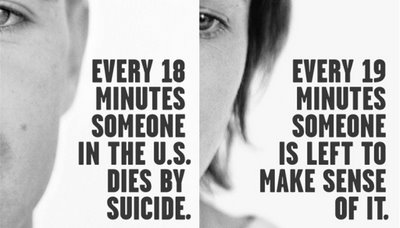
As I have mentioned previously, on October 13, 2005, I was inducted into a rather exclusive club, one which I had no knowledge of before and which I had no desire to enter; yet membership was forced upon me. When I found my boyfriend dead by his own hand in our bedroom, I became a "suicide survivor."
This term has caused confusion at times, some people thinking a suicide survivor would be someone who made an unsuccessful attempt on his own life. But it actually refers to those who are left behind, the loved ones, relatives, friends who have to try to make sense of a supremely-senseless act.
Nearly a decade ago, thanks largely to the efforts of US Senator Harry Reid (D-Nevada), who lost his father to suicide, the Saturday before Thanksgiving each year has been designated by US Senate resolution as National Survivors of Suicide Day in the USA. It has become a powerful day of information, hope, and healing for people who have been thrust into an unimaginably-painful situation, one in which you find yourself grieving for the murderer of your loved one (I put it in such stark terms hopefully to illustrate the extremity of emotions a survivor must deal with, ranging from anger to grief to guilt to confusion).
I try to keep things from getting too heavy on this blog most of the time, but this is one area for which I am willing to dedicate time and space to discuss on occasion. For most of you, this has never struck close to home. But for many, it may touch someone you know, and I would encourage you to keep both this blog and other online resources in your mind, as you may be able to offer help and hope beyond what you can know to a future inductee into the "Suicide Survivors Club."
For further reading on this topic, see these previous Auto-Gratification posts.
Friday, October 13, 2006
| [+/-] |
A Day of Special Memories |

Today I am going to take a day off from posting pictures of hot guys, though this post contains the photo of one of the beautiful ones who has impacted my life. One year ago today, on October 13, 2005, my boyfriend Alfred, one of the most loving and gentle people I have ever known, took his own life in a moment of deep despair. I wrote about his passing a while back on this blog, and you can read that post by clicking on his picture above.
The year that has passed since last October 13 seems like a lifetime...or perhaps a few days. As one of my blogging friends expressed recently, sometimes loss can make you feel that something as frivolous as pictures of hot guys is silly or even inappropriate, and it's true I have days when I just don't feel like doing anything except feel bad (though thankfully those are becoming less and less frequent).
But I am learning to look at loss from a different angle. Of course I miss Alfred, and of course today is a melancholy day for me. But it is a day in which I remember his amazingly full adventuresome life. I focus on his wonderful 36 years in which he infused his enthusiasm and love into the lives of so many he touched, rather than focusing on the few days surrounding his untimely death.
When someone passes, it is traditional to give gifts to those closest to him. But when we lose someone in death, we receive gifts that last far longer than the flowers and cards of sympathy. I have received the gift of appreciating the amazing network of love and support of family and friends that was always surrounding me but which I had never noticed until tragedy struck. I have been given the gift of gaining a new perspective on the importance of grabbing life for all it is worth and never looking back with regret. And I have been blessed with an experience that, although the pain has been unimaginable at times, has changed me at my very core so that now, as I am emerging from the darkest depths and find that I am still able to breathe, I will be able to help others in a way I never could have before. When I say to someone who has experienced deep loss, "I understand," it will carry new weight. And I trust that I will be able to share hope when I find someone who is in that dark place where Alfred was and perhaps even help someone to see that suicide is always a permanent answer to a temporary problem.
Suicide affects millions of people every year. In America, every 18 minutes someone dies by suicide. And it affects the gay community at a higher rate than the rest of the population. This is something each of us should think about. For those in America, a great place to educate yourself concerning this problem is the website for the American Foundation for Suicide Prevention. For those friends in other parts of the world, many countries have similar organizations that I'm sure you can find by doing a Google search. It's a worthwhile investment of your time and thought, I promise.
So, thanks to everyone for bearing with me as I share a personal moment. I hope it will not be a downer to you but rather perhaps it will encourage you to hug your loved ones a little tighter, to write that letter to diffuse the anger in a tense friendship, or to call the person you know who needs a simple word of kindness. Don't live today in a way that will produce regret tomorrow!
Monday, August 14, 2006
| [+/-] |
Out of the Darkness Overnight Walk |

As I mentioned in May that I was going to do, I participated on Saturday and Sunday in the Out of the Darkness Overnight Walk here in Chicago. This is a 20-mile walk intended to raise support for the American Foundation for Suicide Prevention, as well as to increase awareness of the problem of suicide and to decrease the stigma about discussing suicide in society today. My motivation for participating in this walk was that I lost my boyfriend Alfred to suicide ten months ago, on October 13, 2005.
The Out of the Darkness walks were held in San Francisco and Chicago, with over 2,200 walkers raising about $3.5 million for research in suicide prevention and support for survivors of suicide (a term referring to those family and friends who have lost a loved one to suicide). Each participant raises a minimum of $1,000 in order to participate, but some raise much higher amounts. The top fundraiser in Chicago raised $25,000.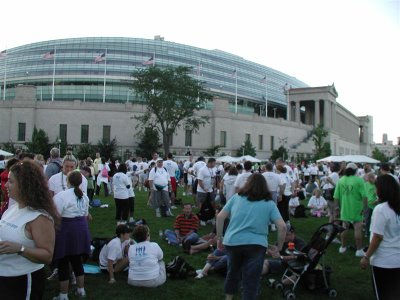
The walk began on Saturday evening at Soldier Field, a place where I had never been before this summer (in spite of having lived in the Chicago area off and on for about 8 years of my life) but where now I have been twice in a month. It would be difficult for me to describe the overwhelming feeling of seeing the 1,200-plus people who were gathering on the lawn, each of whom had been personally touched by suicide.
The participants each wore colored beads, signifying their relation to the person who completed suicide (red for a spouse or partner, white for a son or daughter, orange for siblings, gold for parents, purple for other relatives, etc.). It was moving to see some people who wore two or three necklaces of different colors. The mood was unlike anything I have experienced before, with a soberness and reflectiveness, perhaps even melancholy with a few tears, but suffused with a hope and optimism and a determination to rise above the pain and make a difference that goes far beyond symbolism.
Click below to continue reading about the Overnight Walk...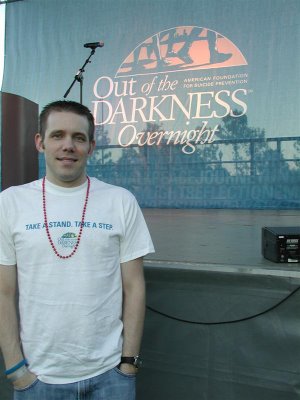
Here I am before the walk begins
I joined Alfred's sister and a group of her friends, each of whom had lost a sibling to suicide. Just as the sky began to become dark, there was a brief opening ceremony, during which several people spoke of their personal experiences and motivation for participating. The executive director of the AFSP spoke and thanked everyone for participating, and then he sent us off.
Again, in a night charged with emotion, it was a powerful thing to look back as we walked from Soldier Field and to see all the walkers snaking their way along the walkway.
Now, on a side note, I have never walked along the lake here in Chicago for any distance late at night before, and I continued to grow in my love for this city. Our path took us from Soldier Field heading north through the museum campus past the Field Museum and Shedd Aquarium, then cut over to Columbus Drive and through Grant Park. Then, we cut back over to the lake and walked past Navy Pier and along the beaches.
At North Avenue Beach, we crossed under Lake Shore Drive and walked up through Lincoln Park, and the route continued all the way north to Foster Avenue Beach. That was the halfway point, and after a midnight meal, the walkers reversed course and returned to Soldier Field.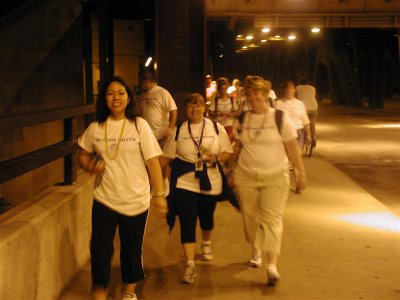
I have mentioned to many people that I hope and pray that nobody I know will ever again have to go through the pain of losing someone to suicide. So, I am grateful for the things I have learned about this problem, and I am so thankful for the chance to be a small part of the efforts to help others struggling with depression so that they and their families can be spared from such horrible tragedy.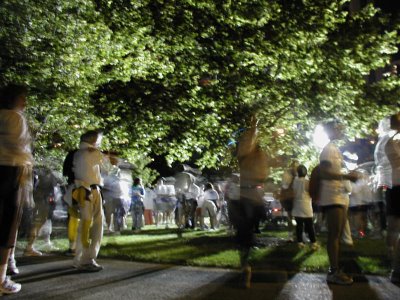
My sincerest thanks and gratitude to each person who contributed to this effort. If you would still like to contribute to this very worthy cause, you can (at least for now) still give a donation on my Overnight Walk fundraising page, or you can give a donation directly on the AFSP website.
Wednesday, May 10, 2006
| [+/-] |
Day 7 - National Suicide Awareness Week |
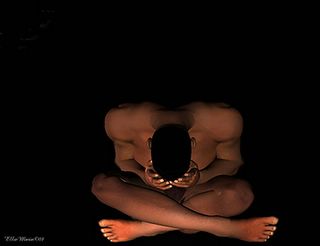
*Note: I have been writing posts each day this week with information that I hope will be helpful concerning the problem of suicide. If you have not already done so, please read my initial introductory post on the topic for my background and a way that you can participate in helping to address this awful problem that devastates so many lives.
Also, if anyone reading this has his or her own blog, I would be grateful if you might be willing to do a post sometime this week mentioning the week (feel free to link to my blog if you want). Most people don't think of suicide beyond the occasional publicized celebrity death, but when it happens to someone you love, you too would wish more was being done to help those who fall into such deep despair. A post this week can be a small step in helping with that cause.
The focus of my posts throughout this week has been primarily on resources to help those who have lost someone they love to suicide. This is understandable since that is where I have come from in recent months. And I did this intentionally, because that has often been an overlooked aspect of the topic of suicide.
But it seems appropriate to close out the week with a post on the problem of suicide itself. Suicide is one of those topics that is not talked about in "polite" company. The stigma surrounding suicide is deep and long-established. Religions have considered suicide to be an unforgiveable sin. Socially, people often assume that suicide can only happen in the "messed up" families, that a suicide likely indicates parental or spousal failing. The person who has lost someone to suicide becomes a modern-day Hester Prynne, wearing a nearly-visible "S" on his or her clothing, always identified as "the one whose [relation] committed suicide."
But the problem of suicide is too large and too devastating for this stigma to continue. Suicide is the 11th leading cause of death in the United States, fourth for those between the ages of 18 and 65. Every 18 minutes someone in the United States completes suicide, and it is estimated that suicide attempts are made once every minute (in reality, the number of suicide deaths is probably far higher than the 30,000 or so confirmed, because many suicides are ruled accidental due to indeterminate situations....i.e. - was it a suicide or a legitimate accident with a gun?). And every one of those suicides leaves a trail of broken hearts and lives of those who are left behind.
I love the symbolism of the AFSP's fundraising walk, the Out of the Darkness Overnight, where those participating walk 20 miles through the night, ending the walk as the sun rises the next morning. It is a beautiful symbol of hope and healing for those in the "darkness" of the pain of losing someone to suicide. But it also is a bold statement that this topic, which has been kept in the shadows for too long, needs to be discussed openly, honestly, and frequently.
I think this quote is excellent: "Suicide is not chosen; it happens when pain exceeds resources for coping with pain." This is an excellent summary of a pretty complex topic, but it covers the two main aspects of the problem. To reduce the occurrences of suicide, we as a society need to help to (1) reduce the pain and/or (2) increase the coping resources.
Happily, many in the medical professions and in politics have begun to see the need to find answers to this problem. The resources today are greater than they have ever before been in history. 24-hour, free-of-charge help is readily available to anyone dealing with suicidal thoughts, from such sources as crisis hotlines like 1-800-SUICIDE. Constant, well-funded, ongoing research continues to identify those at greatest risk and develop strategies for helping those who are facing deep pain and hoplessness.
What causes passion? What issues or topics arouse something within you that prompts you to action? Generally, we don't just randomly select something to which we want to dedicate ourselves and our time; rather, we are confronted through mean of a person, an event, a story, or an experience which so affects us that we are moved to do something about the need we see. So I understand that many who read this will not feel the passion that I do, since I have seen firsthand the devastation caused by suicide. But perhaps hearing my story would encourage someone to put a bit of effort into educating yourself on the topic and contributing to its solution. Perhaps doing that may even help someoone to avoid the devastation altogether.
So, for anyone who may be interested, here are some good starting points on the internet for learning about suicide and how you can be involved in helping address this problem and identifying warning signs for those you love and care for:
- American Foundation for Suicide Prevention
- American Association of Suicidology
- Befrienders Worldwide - I appreciate that they recognize the increased risk of suicide among gay and lesbian people. That's a subject I hope to investigate further in the days to come.
- Hopeline (1-800-SUICIDE)
- Samaritans
- SAVE (Suicide Awareness Voices of Education)
Tuesday, May 09, 2006
| [+/-] |
Day 6 - National Suicide Awareness Week |

*Note: I am going to try to do posts each day this week (no promises) with information that I hope will be helpful concerning the problem of suicide. If you have not already done so, please read my initial introductory post on the topic for my background and a way that you can participate in helping to address this awful problem that devastates so many lives.
Also, if anyone reading this has his or her own blog, I would be grateful if you might be willing to do a post sometime this week mentioning the week (feel free to link to my blog if you want). Most people don't think of suicide beyond the occasional publicized celebrity death, but when it happens to someone you love, you too would wish more was being done to help those who fall into such deep despair. A post this week can be a small step in helping with that cause.
Today's post will be primarily a post of gratitude for a group of people who have been so helpful to me during the process of the past seven months. There is an organization in Chicago known by the acronym LOSS, which stands for "Loving Outreach to Survivors of Suicide." This is a group run by the Catholic Charities office of Chicago, designed to offer full support to those who have lost someone to suicide. They do this in 3 primary ways. First, they publish a monthly newsletter which is sent out free-of-charge to a very large mailing list far beyond the borders of Chicago. Second, they hold monthly support group meetings where survivors can meet other people who have gone through the same experience. Those meetings are run by others who have lost someone to suicide, and they always include a mental health professional to answer questions and give advice. And third, they offer one-on-one counseling with trained therapists, also free-of-charge. I have taken advantage of each of these resources, and they have been key in my getting to the point where I am able to view my experience as a sad but survivable journey.
Support groups and individual therapy are two of the most important resources after the initial days following the suicide. I would strongly recommend that, if a person can in any way handle it, these resources should be investigated within a month or so after the event. The AFSP has a wonderful listing of support groups around the country. That is where I found the LOSS group in my area, and I know others who have found similarly-wonderful groups in their part of the world.
Monday, May 08, 2006
| [+/-] |
Day 5 - National Suicide Awareness Week |

*Note: I am going to try to do posts each day this week (no promises) with information that I hope will be helpful concerning the problem of suicide. If you have not already done so, please read my initial introductory post on the topic for my background and a way that you can participate in helping to address this awful problem that devastates so many lives.
Also, if anyone reading this has his or her own blog, I would be grateful if you might be willing to do a post sometime this week mentioning the week (feel free to link to my blog if you want). Most people don't think of suicide beyond the occasional publicized celebrity death, but when it happens to someone you love, you too would wish more was being done to help those who fall into such deep despair. A post this week can be a small step in helping with that cause.
HOW TO HELP A FRIEND WHO IS DEALING WITH THE SUICIDE OF A LOVED ONE
Death is awkward. There's no way around it. When someone loses a loved one, no matter what the circumstances, there are inevitably awkward social moments that will come. How do you say something meaningful when the person knows his or her loved one will never return? How do you encapsulate into a sentence or two the sympathy and comfort you want to give to the person and how badly you wish you could make things better for those who are hurting?
Suicide, though, is doubly or triply awkward. Not only do those who are grieving experience the sorrow that comes with death, but piled on top of that is anger, guilt, confusion, shock, horror, and trauma that goes beyond the "normal" death.
Medical professionals estimate that around 80% of deaths have at least one or two weeks' warning. But suicide almost always is completely without warning. Natural deaths are generally peaceful, a person quietly slipping away. But suicide is almost always violent and harsh. In death by disease or from other medical reasons, rational explanations can be found. In a car accident, fate or another driver can be blamed. In a murder, there is someone to be angry at. But toward whom or toward what can the suicide survivor turn his negative emotions? He or she will be angry at the very person who has died. This will lead to guilt for being angry or for not noticing the signs in time. That will lead to anger at self or deep sorrow and confusion.
For those who love the person who has experienced this deep loss, there is the added difficulty of this social "stigma" (real or imagined) that surrounds suicide. So again, hoping that nobody who reads this will ever have the horror of suicide visited upon you personally, I still recognize that many of you will be touched in some way by suicide through those you have friendship with. As a suicide survivor, allow me to offer some suggestions that, I hope, will stick in your head and someday help someone to offer real help and comfort to a friend in need:
1. You don't have to say anything! If you are with someone who is grieving and do not know the words to say, don't force it! Don't feel any obligation to speak. You may very well accomplish exactly the opposite of what you intend by saying something stupid. I realize that sitting there in silence may feel very awkward to you, but I will say without hesitation that some of those who were the greatest help to me in those early days were my friends and family who simply sat next to me, put their arm around me or on my shoulder, and let me cry in silence. Your presence next to that person says the one thing that is most needed in those moments, and says it more eloquently than you ever could in words. It says, "I love you, and you are not alone!" Allow yourself to feel awkward in silence, because I guarantee it is not awkward for the person grieving; your presence there physically infuses something that that person has great need of....hope.
2. Allow the bereaved to say anything....or nothing. At various points in the process, I wanted to scream at someone. Who that "someone" was changed from moment to moment. I wanted to yell at God for not keeping it from happening. I wanted to yell at Alfred for not calling me for help. I wanted to yell at anyone and everyone who had ever failed Alfred, including myself. I wanted to say things that were absolutely crazy. And I was blessed to have friends and family who would allow me to say these things without judgment or advice or correction. If the person who is grieving says something hurtful or incorrect or just plain stupid, don't use it as an opportunity to show off your counseling skills. A simple statement such as this will be much more helpful: "[Person's name], I love you. I know you are hurting beyond what I could ever understand. And I'm here for you anytime you need me, for as long as you need me. And I truly believe you are going to get through this." The person probably knows that what they are saying is irrational (and is likely feeling guilty about it), so unconditional acceptance and love in those moments is powerful.
3. Keep your phone on. A person who has lost someone to suicide will very likely find that their sleep has been stolen from them. They will wake up in the middle of the night (if they were lucky enough to fall asleep in the first place) and the loneliness and sorrow will sometimes be overwhelming. Especially in the first few weeks, it is essential that the person has someone to call anytime, day or night. They may feel awkward or say they won't do it, but a couple times I was awake in the middle of the night and actually called a friend who graciously sat and talked to me as long as I needed. Physical darkness can enhance the darkness someone feels inside; having someone to talk them through the night can help a grief-stricken survivor get through until the sunrise reminds them there is still hope.
4. Do things that show you are thinking rather than just reacting. When there is a death, social custom causes the bereaved to be drowned in flowers, calls of sympathy, and letters in the mail. These things are essential and appreciated. However, from personal experience, I will say that all of those things are a blur to me. I probably could not tell you who specifically sent a card or flowers or called me in the days immediately after Alfred's death. What I do remember is the friend who stopped by with "Ensure" meal replacement drinks because, at the wake, he could tell I was not eating well. He told me that, even if I had no appetite for a meal, I should drink one of those to keep my strength up and to get the nutrition I needed. I remember the friend who knew that Alfred and I would attend church together, so that friend offered to go with me the first Sunday I would have gone without Alfred, to make sure I wasn't alone. Yet another friend put together a CD for me of music specifically chosen for lyrics that offered hope without claiming to have all the answers. Things like that require creativity and thought, but they will never be forgotten.
5. Remember the difficult dates. From the day of the suicide until the wake, funeral, and burial are complete (i.e. - the first week or two), the survivor will be surrounded by well-wishers. However, that crowd quickly dissipates after the "official" social processes have been completed, leaving the griever often alone long before the pain has gone away. One way you can remind that person that she is not alone is by remembering the tough dates. The "month-markers" are the first that come to mind in a suicide. Personally, I always think of Alfred's suicide on the 13th of any month. Seven months out, it is not an overwhelmingly-painful reminder. However, the first 6 months are rough to get through (perhaps longer for some), and a call or a note on those month marks will do more than you can imagine to communicate to the person that you truly care. Other dates that are difficult include the deceased person's birthday, any special days they shared (for example, if it's a partner or spouse that has passed away, their anniversary or first date), and special holidays, particularly Christmas. The greater the joy previously associated with a date, the greater potential for sorrow now. (Note: Computer programs can be great helps in remembering these dates. I use Microsoft Outlook for my appointments, and I can set up a reminder for just about anything, including those days I need to remember to call a friend. Set up those reminders on the month-mark days in your appointment program or book; it's a simple thing that speaks volumes.)
There are many other things, but keeping in mind these 5 will set you miles apart from many who will be kind but not really infuse hope to a person who probably feels like there is no reason even to look to the future. Realizing you don't have to fix everything, you can be the "first responder" who helps your friend get through the most critical time in those days following the worst day of his or her life.
**Final note: I won't be so arrogant as to assume anyone would find these thoughts particularly profound; however, if you think they can be helpful to you or anyone else, please do not hesitate to distribute this post freely.
Sunday, May 07, 2006
| [+/-] |
Day 4 - National Suicide Awareness Week |

*Note: I am going to try to do posts each day this week (no promises) with information that I hope will be helpful concerning the problem of suicide. If you have not already done so, please read my initial introductory post on the topic for my background and a way that you can participate in helping to address this awful problem that devastates so many lives.
Also, if anyone reading this has his or her own blog, I would be grateful if you might be willing to do a post sometime this week mentioning the week (feel free to link to my blog if you want). Most people don't think of suicide beyond the occasional publicized celebrity death, but when it happens to someone you love, you too would wish more was being done to help those who fall into such deep despair. A post this week can be a small step in helping with that cause.
One more resource I could not fail to mention is the CD which cover is pictured above, titled Chaos of the Heart. Again, this is a religious resource, and I would say it has been the single-most helpful item I have found for this situation. Combining original music and spoken word, this CD is filled with comfort and perspective that I have not found anywhere else. There is something amazing about music, in that its capacity for holding and expressing emotion cannot be limited. No matter the depth of the sorrow or the height of joy, music can express it unlike any other medium. And the words and music on this CD masterfully weave together the pain, questions, anger, guilt, and sorrow in a very honest way, yet give the listener comfort and hope that they will not only make it through the dark valley but emerge with blessing and joy on the other side.
If you have a friend who is a person of faith who goes through the loss of a loved one to suicide, I cannot think of a single thing you can do to be more helpful to that person in their difficult journey than to give them a copy of this CD.
Saturday, May 06, 2006
| [+/-] |
Day 3 - National Suicide Awareness Week |
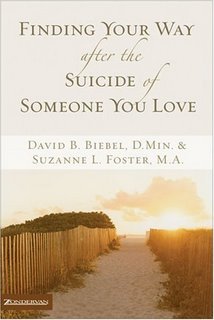
*Note: I am going to try to do posts each day this week (no promises) with information that I hope will be helpful concerning the problem of suicide. If you have not already done so, please read my initial introductory post on the topic for my background and a way that you can participate in helping to address this awful problem that devastates so many lives.
Also, if anyone reading this has his or her own blog, I would be grateful if you might be willing to do a post sometime this week mentioning the week (feel free to link to my blog if you want). Most people don't think of suicide beyond the occasional publicized celebrity death, but when it happens to someone you love, you too would wish more was being done to help those who fall into such deep despair. A post this week can be a small step in helping with that cause.
I am going to do one more post here concerning a book that I have read on the topic of dealing with the suicide of a loved one. There are many books and articles I have read, but this book and the book I mentioned two days ago are the ones I have found most helpful.
Both books offer very good and very helpful advice for those who have found themselves in the depths of this trial, but as a person whose faith is very important to me, I felt the one area the first book lacked was a bold and honest look at the difficult questions that come up for those who believe in a God that we say is good and loving when something tragic such as this happens. The first book is admittedly written to a very broad audience and does an admirable job of offering hope to both religious and secular alike. But because its stated audience is different, it very naturally is more delicate in its approach to religious topics.
Finding Your Way After the Suicide of Someone You Love by David Biebel and Suzanne Foster, on the other hand, is straightforward about the fact that it is written to an audience that holds to a faith in a God as generally defined by the teachings of the Bible. So, if that is not your background, this book may not be as palatable to you, though I think the tenderness and compassion with which the book was written would be appreciated by all.
But suicide does, for those who are people of faith, bring up some very difficult questions that cannot be answered by a pat on the back and some trite religious catchphrases. And, Biebel and Foster handle this in a real way, without glossing over the intense emotions and anger that can very naturally arise within the heart of someone who goes through this seemingly senseless devastation. Thus, I believe this book is essential first reading for a person in grief who is searching for how tragedy can co-exist with the belief in a God who loves those in pain.
Friday, May 05, 2006
| [+/-] |
Day 2 - National Suicide Awareness Week |

*Note: I am going to try to do posts each day this week (no promises) with information that I hope will be helpful concerning the problem of suicide. If you have not already done so, please read my initial introductory post on the topic for my background and a way that you can participate in helping to address this awful problem that devastates so many lives.
Also, if anyone reading this has his or her own blog, I would be grateful if you might be willing to do a post sometime this week mentioning the week (feel free to link to my blog if you want). Most people don't think of suicide beyond the occasional publicized celebrity death, but when it happens to someone you love, you too would wish more was being done to help those who fall into such deep despair. A post this week can be a small step in helping with that cause.
One of the difficulties someone who has lost a loved one to suicide faces is dealing with the feeling that nobody else really understands the pain that he or she is feeling. Well-meaning, loving people graciously try to offer comfort by saying, "I know what you're going through" or "It will get better; you just have to give it time." But for the person who is dealing with a suicide particularly, those words often provide little comfort, because as one psychologist put it, you are dealing with two tragedies simultaneously. You are dealing with the most intense, irreconcilable emotions; put into the unimaginable position where you are grieving for the very person who killed your loved one.
Fortunately, today there are more resources and avenues for help than ever before in history for those dealing with surviving a suicide. And one of the resources for which I have been grateful is the Survivors of Suicide website. Started by a person who had gone through this tragedy and wanted to help others in similar circumstances, it is a subscription-membership site (very reasonable price set only to help pay for the cost of running the site) that is limited to only those who have actually lost a loved one to suicide. It is filled with articles, advice, poems, and memorials that can offer comfort in dark moments.
But especially within that site, there are a host of wonderful people who will correspond with someone who is grieving and, from a perspective that cannot be shared except by someone who has survived the same ordeal, offer hope that the newly-bereaved person can make it through this difficult time. I found this site just a couple days after Alfred's death, and I went there often in the initial months following his death. I still go there on occasion to check in, and I have been glad to see that I have now been able to offer comfort and hope to others who are just entering into the process.
Again, as with the book I mentioned yesterday, this is a resource for which I hope nobody reading this ever has need personally. But, if suicide ever impacts someone you know, here is a wonderful, safe place to send the person for comfort and encouragement that they may not know where to find elsewhere.
Thursday, May 04, 2006
| [+/-] |
Day 1 - National Suicide Awareness Week |
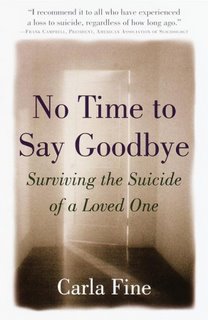
*Note: I am going to try to do posts each day this week (no promises) with information that I hope will be helpful concerning the problem of suicide. If you have not already done so, please read my initial introductory post on the topic for my background and a way that you can participate in helping to address this awful problem that devastates so many lives.
Also, if anyone reading this has his or her own blog, I would be grateful if you might be willing to do a post sometime this week mentioning the week (feel free to link to my blog if you want). Most people don't think of suicide beyond the occasional publicized celebrity death, but when it happens to someone you love, you too would wish more was being done to help those who fall into such deep despair. A post this week can be a small step in helping with that cause.
I am far enough removed from the events of last October that I am able to look at things from a bit more balanced perspective than when I was in the throes of the pain and shock closer to the event. I am at the point where I tend to look back at the death of Alfred with just a contemplative sadness rather than the overwhelming uncontrollable sorrow I used to feel. And, I am learning that one of the greatest ways for me to move on and become a stronger person from the experience is to use the insight that I have been given to help others going through similar circumstances.
For in the initial days and weeks after losing someone to suicide, a person feels dazed and confused. Sometimes you burst into tears uncontrollably with no warning and regardless of where you are (as I did in such places as church or walking down Broadway near my home); other times you feel no emotion at all and just sorta sit and stare. But the overwhelming sense during that time is a feeling of being completely lost. Suicide is not generally talked about in "polite company," so those thrust into the experience find themselves without warning in uncharted territory, as if they woke up one morning like Michael Douglas in the movie The Game, buried alive in a tomb somewhere in Mexico but not knowing where you are. You feel as if you want to just stay in the tomb and not go out, because when you do, you don't speak the language of the experience to even know how to ask for help.
It was during that time that I was so grateful for another person, a bit further along in his experience after losing his mother to suicide, who recommended a book that truly became my road map to find my way out of the tomb and back to familiar ground. That book was No Time to Say Goodbye: Surviving the Suicide of a Loved One by Carla Fine (a suicide survivor herself, having lost her husband). As I have continued to learn about suicide (first to help me and now in an effort to be able to help others), I have found that there is a large body of work addressing the topic of suicide (a search of Amazon.com's "Suicide" category brings up 2,103 results), so there are many more resources than I have been able to examine personally. But this book, speaking as one who read it barely a week past the suicide itself happening, is a superb, compassionate, hope-filled book that is very reasonable priced ($10.74 on Amazon), currently in print, and able to be found at the major bookstore chains (I have purchased copies at both Barnes & Nobles and Borders near my house).
Hopefully nobody who reads this will ever have need to read this book yourself, but it is very possible that sometime, someone you know and care for will be faced with this unimaginable situation. Those who have not gone through such a situation often feel awkward and don't know what to do or say. I hope later this week to offer some suggestions for helping a friend who is going through such pain, but here is one very simple way you could be a help in a very tangible and meaningful way and know that you are really making a difference for the person who is still trying to "learn the language" of their new experience.
Wednesday, May 03, 2006
| [+/-] |
National Suicide Awareness Week |

Beginning tomorrow, May 4, and continuing through the 10th is National Suicide Awareness Week. This week has a newfound significance because on October 13, 2005, I faced the worst moment of my life, when I found my boyfriend Alfred hanging by a rope in the bedroom of his apartment. In a moment of despair after a long, brave struggle with depression, he became one of the over 30,000 people in America last year who committed suicide.
Needless to say, the past almost-7 months have been quite a journey for me. But, I have slowly moved from dwelling on the past to focusing on the future, and I have learned that difficult times in life bring unexpected gifts that can enrich us and make us stronger.
One of the gifts I have received is an understanding and awareness of suicide and the devastation it causes to everyone it touches. And along with this is a desire to help those who are facing the same deep pain that Alfred found to be overwhelming, to let them know there is hope and they are not alone.
One of the greatest organizations working toward the understanding and prevention of suicide as well as support for those who lose a loved one to such an unimaginable event is the American Foundation for Suicide Prevention. I recently read their 2005 Annual Report and was amazed and impressed at the depth and breadth of their research and progress in addressing the problem of suicide.
So, it is with excitement and full support of the AFSP that I decided to participate in their annual fundraising drive, the Out of the Darkness Overnight Walk. It is a 20-mile walk from dusk to dawn through the cities of Chicago and San Francisco this summer. I love the symbolism of the overnight walk, which goal is both to raise funds for the AFSP and to help fight the social stigma of discussing suicide (bringing it "out of the darkness"). I will be doing the Chicago walk on August 12-13.
I know there are many good organizations out there asking for support for many causes. But if you feel challenged to do so, I would be grateful for anyone who would like to help me with my own fundraising efforts. My personal goal is to raise at least $2,000. Click on the picture above or this link to visit my personal fundraising page. Also, the various links on this post point to much more helpful information about the need and the organization. Thanks!
Friday, February 24, 2006
| [+/-] |
October 13, 2005: The Day Alfred Left |
On October 13, 2005, my boyfriend Alfred committed suicide in a moment of dark depression and despair. I stood outside his locked bedroom door and heard the crash and sound of his choking, but I could not get inside the room quickly enough to stop the desperate act. Below is my account of that morning. I wrote this several months after Alfred's suicide, but I wrote it as if I were writing on that day.
This morning, I called Alfred at
In a panic, I screamed (a deep, guttural cry–“NO!!!!!”–that came from someplace very dark and seemed to come from someone other than myself) and cried and ran over to try to get him down. However, the rope was so tight that I could not get it loose, and all I could do was to lift up his body to relieve the pressure until the paramedics could get into the house and cut him down. I was standing there holding him up for what seemed like forever, balanced on the nearby radiator so I was essentially at eye level with him. His eyes were empty and tears streaked down his cheeks. When the paramedics cut the rope, Alfred still had a faint pulse. They worked on him all the way to the hospital, but they were unable to revive him, and he passed away just as they were arriving at the hospital.
Since Alfred left no note, I can only speculate about what happened between our saying goodnight the night before and the 6:30 a.m. phone call. I knew Alfred had been struggling withh depression brought on by a number of circumstances, although I had no idea it was so severe. Numerous times before, when he was feeling low, I would talk to him on the phone or go and stay with him to try to cheer him up. My best guess is that sometimes that night, he hit a very low point of depression. But this time, rather than calling me, he did not have the strength to call and ask for help. The pain must have been overwhelming and suffocating and he could think of nothing other than escaping from it. And thus, I found myself holding my boyfriend's body in my arms and laying him on the bed in vain hope that the paramedics could somehow revive him.
To this day as I write this, months after Alfred's death, I have very patchy memories of the hours and days following the moment the policeman received the call from the paramedics and told me Alfred was dead. I remember, in the moments leading up to that call, I called Alfred's uncle and told him that Alfred was in the hospital and he needed to go there quickly. That is all I could say, and I hung up. Barely able to move, I then fell on my face in Alfred's living room praying and crying out to God to somehow show mercy and allow Alfred to live. When the policeman told me Alfred was gone, I lost all strength, all mental focus, all ability to function. I sat on the couch, barely crying, my mind grappling with this piece of information that it simply did not know how to process. Something instinctive reacted, though, and I became sick to my stomach and threw up.
As I came out of the bathroom, it slowly began to dawn on me that the policemen, though professional and courteous, were not treating me as a grieving boyfriend, but rather as a potential murder suspect. In hindsight, I understand why this is necessary, since they saw me holding Alfred's body as they walked into the house. I can remember being frustrated that the paramedic did not move quickly to cut Alfred down, but I now see that he was hesitant because he didn't know the circumstances and was initially uncertain what my role was in all of the events. For the next 3 or 4 hours, I was questioned by two or three policeman, a detective, medical examiners, and a crime scene photographer. For in any death that is not from natural causes, the police have to treat it as a crime scene until they can establish that it actually was a self-inflicted death. And I was the one who was there when they first saw the body, so I was the prime suspect. Still, this balanced perspective is in hindsight; at the time, the inconceivability of being considered a murder suspect simply boggled my mind that was already wanting to shut down from the pain and shock of losing the guy I loved so dearly. Eventually, though, as it became clear to the authorities that I was indeed innocent of any wrongdoing and in fact devastated by Alfred's death, their professional courtesy changed into kindness and concern for me. One of the policemen even gave me his own phone number and told me to call him anytime if he could help me in any way.
I recall after finding out Alfred was gone that I felt lost, like a small child at the fairgrounds who has been separated from his parents. Nothing seemed familiar, everything seemed bigger and out of proportion. I wanted to run, but I didn't know where to go. Instinctively, I called my parents. They were in Georgia for work, and my dad answered the telephone. As soon as I heard his voice, I began sobbing. I could not speak for several minutes, during which time my father grew greatly concerned. As I slowly was able to tell him what happened and how I had found Alfred, I could hear him begin to cry and he said over and over, "Oh, I am so sorry." Just as I got the basic facts out, the policeman told me he had some questions for me, so I told my dad I would call back in a few minutes. When I called back, my mother answered the phone and once again I began crying. At this point, I seriously reverted to a child-like mentality, calling her "mommy." Here I was, a 30-year-old man, shattered, saying over and over again, "Mommy, I don't know what to do." She offered to call a pastor, and I told her I would call back after the police were done with me. I then called my best friend but he was on the highway and I didn't want to tell him while he was driving, so I asked him to call back, which he did a bit later. By this point, I knew I needed someone to be there with me, so I called a friend who was in college but I knew had the day off. He immediately came over and basically took care of me from that moment (maybe
I don't remember much about the rest of the day, with one exception that I will mention in a moment. I remember my friend went to 7-11 to get me some food and something to drink. I remember the phone ringing constantly, until I got to the point I could not talk to people anymore. I remember having Alfred's cell phone and its ringing constantly throughout the day as people tried to reach him, not believing the horrific news they were being told. I never answered his phone. I remember eventually the policeman telling me I could leave, that the death was ruled a suicide and I was not a suspect any longer. I remember being at my friend's apartment, vague memories of being in a taxi on the way there. I'm not sure what I did while at his apartment nor how long I was there. Eventually I know I was back at my place, though I don't know when that was, either. At some point, my best friend got home from work and stayed for a long time. And he and my other friend took me to a nearby cafe for dinner (I highly doubt I ate anything). For several months, I had no memory of that dinner, until one day early in 2006 I went there and saw a sign that had struck me that day, one of their advertising slogans that read: "Pinch me, I must be dreaming." When I saw that, suddenly I remembered having been there that day. I'm not certain where I stayed the night, whether it was at my place or at my friend's, but I remember the next morning (Friday) waking up and going to Jamba Juice then seeing my mother pull up with some family friends as we came down our street.
On Thursday, though, there is one memory that stands out more vividly in my memory than any other from the point I learned Alfred was unable to be revived. I knew that, before going to bed, I had to go back to Alfred's place because his dog was left there and needed food and to be walked. So, along with my two friends, we returned early that evening to get the dog and its stuff and take it back to my place until arrangements could be made for him. As I returned to his house, I saw the sad scene once again, this time without policemen and paramedics walking about.
But it was at the moment that I walked into the bedroom that I began to hyperventilate and cry until I could not stand. I sunk to the floor next where I found him and sobbed. I saw that Alfred’s final hours were obviously ones of deep sadness. In places around the room there were tear-stained tissues. Next to where he had been hanging, I found the Bible that I had loaned to him and some sort of inspirational book. His bed sheets were mangled and draped along the side of the bed. He was wearing sandals, but they had fallen off in his struggling, and they were lying askew on the floor beneath where I found him. The curtain by the closet had been disturbed by the rope, which was still tied to a pipe at the ceiling. And the air conditioner that I had pushed into the bedroom in order to climb in through the window was still lying on the floor. Also, in the living room, I found some photos that Alfred had torn into small pieces, photos of a circuit party, I believe. They were lying on the floor by the couch, obviously having been thrown in emotion after he tore them up.
Suddenly, I felt an overwhelming urge to “fix” the bedroom. I made the bed, closed the curtain, straightened up the shoes and some nearby clothing, threw away the tissues, took the air conditioner into another room, and just tried to arrange things neatly. I was beside myself with grief, and barely with knowledge of what I was doing, I wanted to make the room look nice for Alfred, so others would not see how it looked in his sadness. My two friends stood outside the bedroom door, probably very concerned as I would not allow them to come into the room….I felt I had to make it all perfect. Alfred couldn’t have left how he did. Surely if I cleaned up the room like I always had in the morning, he would call me after work and everything would be ok again. It was the moment at which I came closest to having a complete breakdown….I have never felt so lost and anguished as on that day.
How did October 13, 2005, change my life? In every conceivable way.
I wrote a poem to Alfred after his death, which I placed with him when he was buried. It expresses the joy, pain, sorrow, and hope of this person who changed my life and who had to leave us far too soon.for Alfredo
Friends, nothing more
Several years, casually
Knowing, but not noticing, each other.
Until a warm spring evening
A simple kindness awoke me
And I saw what had always been there but overlooked.
A heart that looked to others
Even those unknown, if you could help
You would take them in your arms.
Lovers, and becoming more
Only months, intensity
Loving, and needing, each other.
A frenzied summer
Your love awoke me
And I saw what happiness you could bring.
Your heart was mine
And mine was yours.
Each night you held me in your arms.
Travelers, stumbling together
The final weeks, crumbling
Hurting but then forgiving each other.
The beginning of Fall
Our love never fell
But we saw the pain that sickness could bring.
Our hearts ached together
I wanted to help
But all I could do was hold you in my arms.
Departed, I wanted more
The time went by too soon.
Yet even at the end we had each other.
A clear October morning
Your call awoke me
But then I learned the sorrow that nothing else could bring.
My heart is broken
I couldn’t help you
I held your body, asleep, in my arms.
Memories, and so much more.
My lifetime I will never forget you.
To cherish that we loved each other.
And each new morning
As day awakes me
I have the hope that one blessed thought can bring:
For just beyond what my heart could see that morning
Angels helped you stand
And joyfully, peacefully placed you in God’s Arms.












4 comments:
Post a Comment